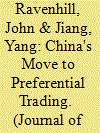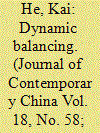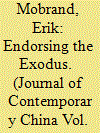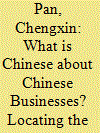|
|
|
Sort Order |
|
|
|
Items / Page
|
|
|
|
|
|
|
| Srl | Item |
| 1 |
ID:
085957


|
|
|
|
|
| Publication |
2009.
|
| Summary/Abstract |
China was a latecomer to the preferential trading bandwagon that has swept East Asia in the years since the financial crises. The Chinese government was unwilling to go down the path of negotiating bilateral and minilateral agreements until the terms of its accession to the World Trade Organization were finalized. Since then, it has become one of the most active participants in the negotiation of preferential trading arrangements, currently being engaged in negotiations with more than 20 countries. The paper will address the following questions about China's move to preferential trade: (a) What forces are driving China's approach to the negotiation of preferential trade agreements? (b) To what extent is it possible to untangle economic and political motivations in China's choice of partners for PTA negotiations? And, which economic interests are being pursued most aggressively? (c) How are conflicting domestic interests reconciled in the policy-making process? (d) To what extent will the new PTAs facilitate Chinese-dominated production networks in the regions? (e) What overall impact will the PTAs have on the Chinese economy?
|
|
|
|
|
|
|
|
|
|
|
|
|
|
|
|
| 2 |
ID:
085968


|
|
|
|
|
| Publication |
2009.
|
| Summary/Abstract |
This paper occupies a middle ground in the debate between regional area specialists in foreign policy analysis and international relations theorists in international studies. Based on balance of power and balance of threat theories, a 'dynamic balancing' model is introduced to explain states' foreign policy strategies. Its claims are: (1) the polarity of the international system shapes whether a state's strategic choices should be balancing with external efforts or balancing with internal efforts; (2) leaders' perceptions of external threats determine when and how a state pursues different balancing strategies. The application of the dynamic balancing model to China's balancing strategies towards the United States suggests that the future of Sino-American relations depends on the strategic interactions and mutual threat perceptions between the two nations.
|
|
|
|
|
|
|
|
|
|
|
|
|
|
|
|
| 3 |
ID:
085969


|
|
|
|
|
| Publication |
2009.
|
| Summary/Abstract |
Discussions of migration in contemporary China often center on the distinctive institutions, especially household registration (hukou) regulations, which continue to limit the options of rural people in cities. This paper draws attention to how another part of the Chinese state has engaged migration: governments in communities of origin. Evidence from Sichuan in the 1980s reveals that local leaders authorized, facilitated, and even organized out-migration of villagers, at a time when Beijing gave scant indication of official approval of peasant migration. Local innovations to sanction migration built directly on the broader trend of rural cadres becoming increasingly responsive to local economic needs. The story of local government involvement in out-migration indicates that the relationship between migrants and the Chinese state has transformed fundamentally, even though formal institutions governing urban residence have changed minimally. As in other fields of social and economic life in China, authority over migration has fragmented.
|
|
|
|
|
|
|
|
|
|
|
|
|
|
|
|
| 4 |
ID:
085970


|
|
|
|
|
| Publication |
2009.
|
| Summary/Abstract |
China's attitude towards UNPKOs has experienced two shifts since the 1980s. One is about changing from non-financial-support, non-voting, and non-participation concerning peacekeeping to financial-support, voting, and participation in 1981. The other shift concerns China's gradual change in its attitude toward non-traditional peacekeeping over the 1990s. This paper provides a norm perspective on the issue. Specifically the author argues that China's attitude toward UNPKOs changed as a result of the change in international norm from prioritizing sovereignty to prioritizing human rights, and the diffusion of the norm of human rights into China through a variety of agents such as foreign policy elites and two special groups of PLA officers.
|
|
|
|
|
|
|
|
|
|
|
|
|
|
|
|
| 5 |
ID:
085963


|
|
|
|
|
| Publication |
2009.
|
| Summary/Abstract |
This article answers the following question: 'What is the organizational medium that has allowed a few Chinese businesspeople in East and Southeast Asia to accumulate considerable wealth and economic power?' In the course of giving an answer, we show the organizational differences between traditional business networks in the late Qing and early Republican periods and the Chinese business networks in modern capitalist Asia. We argue that, throughout the twentieth century, Chinese business people outside of China proper began to adapt Western corporate structures for their own purposes and that this organizational innovation allowed Chinese to develop and sustain personal networks through which wealth and power could be concentrated.
|
|
|
|
|
|
|
|
|
|
|
|
|
|
|
|
| 6 |
ID:
085967


|
|
|
|
|
| Publication |
2009.
|
| Summary/Abstract |
The composition of Greater China among the PRC, Hong Kong and Taiwan entails an emerging form of micro governance where an ecological evolution of sub-group interaction and crossover of economic and social activities has been generating a dynamic of change within the East Asian region. The constitution of Greater China by social, economic, political, business and even daily commuting creates some soul searching questions about the possible outcomes of their intense interaction. To what extent has integration been made within Greater China through these interactions? Is China the economic linchpin or does China need to cooperate in one way or another to facilitate the modes of economic development? What are the attitudes and strategies used by Hong Kong or Taiwan when confronted with such an economic cum social entity? More importantly, where, and, under what conditions, will the interactions among the PRC, Taiwan and Hong Kong lead to? In this paper, I am going to use a conceptual model which includes four interactions: integration, interdependence, identity and independence (Four Is) to capture the catalyst of change that collectively entails these intermingled economic, social and cultural elements. People who live in the vast context of this geographical region experience the change. Through daily interaction, they help write the context of change through business activities, investment, migration, trade, culture, academic exchange, political and social development along the Four Is.
|
|
|
|
|
|
|
|
|
|
|
|
|
|
|
|
| 7 |
ID:
085948


|
|
|
|
|
| Publication |
2009.
|
| Summary/Abstract |
The interaction between two perspectives-China as a world factory and Chinese business knowledge-has been complicated by the ever greater tensions generated from the national-China-and the transnational actors-Chinese-in understanding the economic driving force behind the real meanings of the rise of China. The construction process of the rise of Chinese economic power puts the state in direct contact with regional and global economic/political changes. On the one hand, Chinese business knowledge, identities, economic and political interactions also give rise to the notion of network building and sub-regional development, which help transcend country-specific relations. On the other hand, the notion of the rise of China is still being re-constructed through the interplay between regional and global political economy.
|
|
|
|
|
|
|
|
|
|
|
|
|
|
|
|
| 8 |
ID:
085966


|
|
|
|
|
| Publication |
2009.
|
| Summary/Abstract |
This paper argues that the fluidity that permeates the contemporary international community is driven by especially political and economic globalisation, which has a huge impact on the relationship between the nation and the state. As the individual nation state is increasingly dependent on the international community for its economic survival this dependency on the global has as a consequence that it rolls back aspects of national sovereignty thus opening up the national hinterland for further international influences. These developments initiate a process of disaggregating state and nation, meaning that a gradual disarticulation of the relationship between state and nation produces new societal spaces, which are contested by non-statist interest groups and transnational more or less deterritorialised ethnic affiliated groups and networks. The argument forwarded in this article is that Southeast Asians of Chinese descent utilise these newly created spaces for setting up diasporic-like networks thus providing substance for transnational ethnoscapes or nations without states.
|
|
|
|
|
|
|
|
|
|
|
|
|
|
|
|
| 9 |
ID:
085971


|
|
|
|
|
| Publication |
2009.
|
| Summary/Abstract |
The privatization of urban housing and the subsequent development of a mortgage market have played a major role in the development of China's financial system. This paper explores the history and development of China's urban housing market, its impact on the financial system, and the government's efforts to grapple with new issues that have surfaced alongside these reforms. This paper concludes that although housing privatization has helped strengthen the financial standing of state-owned enterprises, urban residents, and commercial banks alike, systematic weaknesses must be addressed in order to promote sustainable economic growth.
|
|
|
|
|
|
|
|
|
|
|
|
|
|
|
|
| 10 |
ID:
085952


|
|
|
|
|
| Publication |
2009.
|
| Summary/Abstract |
There is an implicit but commonly held assumption that Chinese businesses are distinctively Chinese. Casting them in unitary and national terms, this assumption has often provided the underpinnings for the conception of the strength of Chinese businesses as signs of an emerging China threat. Drawing on a global production networks (GPN) approach, this paper aims to question the assumption by arguing that many Chinese businesses, embedded in the expanding global and regional production networks, have taken on important transnational characteristics. Given these transnational connections, Chinese business networks in both 'Greater China' and China proper are characterized more by diversity and fragmentation than by cultural coherence and homogeneity. This analysis of the transnationalization and fragmentation of contemporary Chinese businesses helps better understand and respond to the complex challenge posed by the economic dynamism in China.
|
|
|
|
|
|
|
|
|
|
|
|
|
|
|
|
|
|
|
|
|